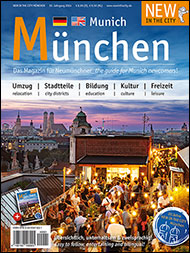
We owe the origin of beer to the accident of someone happening to witness the fermentation process, or more precisely, the good fortune that some bread dough was left standing. Beer’s beginnings date back to ancient times; the Sumerians were already brewing beer between the Tigris and the Euphrates in the fourth millennium before Christ. The Egyptians went to work on unbaked bread dough. The Greeks used barley water for healing purposes and even Caesar is said to have revived his troops with nutritious beer, although the “barbarian” drink was less favored by the wine-loving Romans.
Beer amphorae found near Kulmbach, dating back to 800 B.C., are the oldest proof of German beer manufacture. The oldest existing commercial brewery is Weihenstephan – it received its license to brew and sell beer in 1040 A.D. The Munich monastery was crucial to the development of the brewing arts. In the 14th Century, Augustinian monks brewed their beer under the slogan “Liquida non frangunt ienum” (A liquid does not break the fast). In consideration of their hard work and often meager meals, especially during periods of fasting, beer was considered liquid nourishment; the monks could have up to five servings a day. Brewing success seemed haphazard back then, since people first learned about yeast bacteria from Louis Pasteur. Only then could the bacteria be used systematically. As a result, the brewing process was a mystical affair with elements of superstition and incantation.
Soon breweries were professionally run and licenses were granted to “secular” citizens as well. Industrialization and the blossoming of cities ultimately turned the brewery business into an independent trade, and the Hanseatic League exported the popular drink to all corners of the world.
Especially in Munich (and of course in all of Bavaria), beer plays an important role even today and provides a diverse variety throughout the year. The “Beer Year” starts in spring with the strong beer season; Munich breweries serve Bockbier until the end of April. The Maibock reaches the market as the special beer for May, and cozy beer gardens provide refreshment in summer. When the beer garden season comes to a close, the “Wiesn” potpourri begins. Our loyal companion is transformed into the Oktoberfest beer that is loved in country after country. Ultimately, the year draws to a close at Christmastime with a festive gulp of Festbock, and then the beer cycle starts all over again in the Bavarian capital.
In January 1823, when the Munich National Theater was on fire, people even tried to extinguish the blaze with beer because all the water connections and reservoirs were frozen solid. Unfortunately, the theater burned down, and beer prices were increased to compensate breweries for the sacrifice of their beer.
Adherence to the purity law is crucial, and not just for the quality of the beer in Munich. The German purity law was first proclaimed on April 23, 1516. Breweries have complied with it ever since. No matter where the beer flows in Germany, it may not contain anything besides water, hops and barley (later yeast joined the list).
Good to know:
- Rumor has it that the “clinking” of steins became a popular table custom as a way to demonstrate trust. In the Middle Ages, it was quite common to dispatch contemporaries to the hereafter with poison. People clinked so forcefully that beer sloshed over into other steins as a test to see whether someone in the group was planning an assassination. If someone feared that his own poison might slosh into his own glass and did not clink his stein, he would arouse suspicion. Thus: Trust only those with whom you have had a beer and clinked glasses.
- In Germany, there are 5,000 different beer brands and 1,200 breweries. Each region on the map has its own beer specialty and every city sells at least one specially made beer. In northern Germany, the beer is rather bitter, and the South has pale and wheat beers. The Rhineland is known for its Kölsch and Alt, and Berlin the capital for its Weiße. There are many other varieties as well, including Export and Bockbier, along with Weihnacht (Christmas), Oktoberfest, Märzen and Kräusen beers.
›› Want to take a virtual tour of a brewery?






